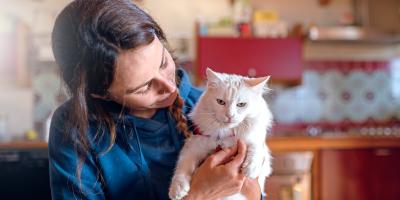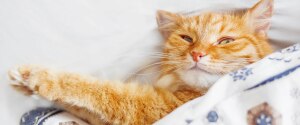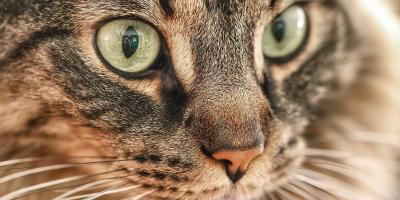
If you've observed your cat for any length of time, you might have noticed that she spends a lot of time in kitty dreamland. From early kittenhood to the senior years of a cat's life, sleep takes up a significant portion of a feline's daily schedule. When you're contemplating why cats sleep so much, the answer lies in feline biology.
How Many Hours Do Cats Sleep?
Cats sleep an average of 13 to 16 hours per day. Some especially sleepy felines fit up to 20 hours of cat napping into their daily schedule.
The age of your cat can affect how much she sleeps. Kittens tend to sleep more than older cats, spending most of their day napping. As your kitten grows into a young cat, you may notice her getting more active and spending less time sleeping throughout the day. An aging cat may start slowing down and spending more time asleep. Senior cats often take more frequent naps and stay asleep for longer periods of time when they do stop to rest.
How Much Do Cats Sleep Under Different Conditions?
You might notice your cat sleeping more when it is cold or rainy outside. Cats do this to save up their energy during periods when outdoor exploration isn't possible, so they are ready to go once the weather lets them start roaming and hunting again.
Why Do Cats Sleep So Much?
Cats spend a lot of their day sleeping because their bodies are designed for hunting. Being a predator takes a lot of energy. Activities such as climbing, pouncing and chasing prey require bursts of exertion, and cats have to stay completely alert during hunting sessions. House cats still have these instincts to alternate high-energy periods with long sleep sessions.
Long naps help your domestic cat recharge from pouncing on cat toys during play time or intently watching birds through the window, just as her wild ancestors rested before heading back out to stalk and chase prey. While your cat isn't dependent on inconsistent hunted meals and used to getting her dinner from a bag or can, her genetic instincts guide her to rest a lot just in case she has to chase down her next meal.
Do Cats Sleep At Night?
Contrary to popular belief, cats aren't completely nocturnal. Instead, these little predators are most alert at dawn and dusk, when prey such as birds or mice also tend to be active.
You might have noticed your cat running up and down the hallway or jumping onto your bed early in the morning or late in the evening just as you're getting ready for bed. While this isn't the most convenient time for most humans, cats are just following their natural instincts to be awake when their wild ancestors were.
Despite all their morning and evening activity, many domesticated cats adapt to their owners' sleep routines. Giving your cat scheduled meals, accessible fresh water and plenty of play time helps her match your schedule to sleep more at night and remain alert when you're ready to interact.
What Is a Catnap?
Cats doze in short bursts during the day and night. These short sleep periods are often called catnaps, and humans can also engage in these short, refreshing naps. Take some inspiration from your favourite feline next time you need a brief respite from everyday tasks and enjoy a quick catnap that leaves you ready for action once you wake up again.
Do Cats Have Different Types of Sleep?
Cat sleep patterns include two different types of sleep, a light doze and a deeper sleep. During light sleep, your cat stays somewhat aware of her surroundings. Her ears remain erect and might even turn or angle toward sounds in the environment. A light-sleeping cat may keep one eye half-open to watch for anything unusual, and you might notice your cat's tail gently swishing from side to side while she rests. Cats engaged in light sleep are ready to wake up and spring into action if the situation requires it. Generally, a cat stays in light sleep for 15 to 30 minutes at a time.
Deep sleep for cats occurs in much shorter bursts of about five minutes per session. During this type of sleep, your cat grows completely relaxed and becomes harder to wake. You might notice paw twitching or see your cat unconsciously padding the air with her feet during deep sleep.
Why Do Cats Sleep on You?
Some domestic house cats like to sleep next to — or even on top of — their owner. Whether she's curled up in your lap on the sofa or lounging across your feet in the bed, your cat's choice to sleep on you is a sign that she trusts and loves you. Cats also like cuddling their way into a cozy nap on a warm human when it's chilly. If you want to encourage your cat sleeping on you, offer some petting and scratching to help her relax the next time she snuggles up near you.
Does Your Cat Sleep Too Much?
Chances are, your cat doesn't sleep too much, even if it seems as though they spend most of the day curled up asleep in a safe, comfortable spot. A cat's natural sleeping pattern includes a lot more time asleep than the average human.
The time to worry is when you notice a distinct change in your cat's sleeping patterns. If your cat is suddenly sleeping much more or less than normal — or sleeping in strange places such as napping in the litter box, schedule a vet checkup to make sure she's healthy. Some things that can cause excessive sleepiness in cats include anaemia, gastrointestinal problems, depression and pain.
Related articles



